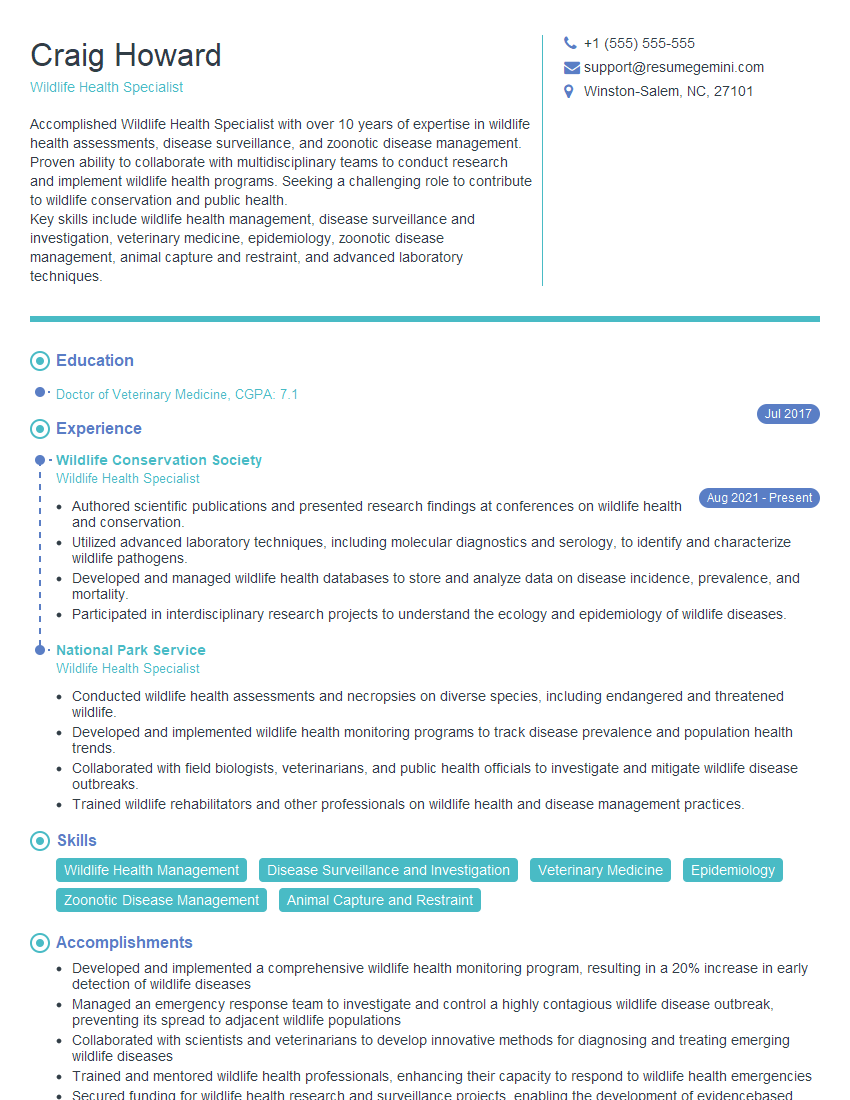Are you a seasoned Wildlife Health Specialist seeking a new career path? Discover our professionally built Wildlife Health Specialist Resume Template. This time-saving tool provides a solid foundation for your job search. Simply click “Edit Resume” to customize it with your unique experiences and achievements. Customize fonts and colors to match your personal style and increase your chances of landing your dream job. Explore more Resume Templates for additional options.

Craig Howard
Wildlife Health Specialist
Summary
Accomplished Wildlife Health Specialist with over 10 years of expertise in wildlife health assessments, disease surveillance, and zoonotic disease management. Proven ability to collaborate with multidisciplinary teams to conduct research and implement wildlife health programs. Seeking a challenging role to contribute to wildlife conservation and public health.
Key skills include wildlife health management, disease surveillance and investigation, veterinary medicine, epidemiology, zoonotic disease management, animal capture and restraint, and advanced laboratory techniques.
Education
Doctor of Veterinary Medicine
July 2017
Skills
- Wildlife Health Management
- Disease Surveillance and Investigation
- Veterinary Medicine
- Epidemiology
- Zoonotic Disease Management
- Animal Capture and Restraint
Work Experience
Wildlife Health Specialist
- Authored scientific publications and presented research findings at conferences on wildlife health and conservation.
- Utilized advanced laboratory techniques, including molecular diagnostics and serology, to identify and characterize wildlife pathogens.
- Developed and managed wildlife health databases to store and analyze data on disease incidence, prevalence, and mortality.
- Participated in interdisciplinary research projects to understand the ecology and epidemiology of wildlife diseases.
Wildlife Health Specialist
- Conducted wildlife health assessments and necropsies on diverse species, including endangered and threatened wildlife.
- Developed and implemented wildlife health monitoring programs to track disease prevalence and population health trends.
- Collaborated with field biologists, veterinarians, and public health officials to investigate and mitigate wildlife disease outbreaks.
- Trained wildlife rehabilitators and other professionals on wildlife health and disease management practices.
Accomplishments
- Developed and implemented a comprehensive wildlife health monitoring program, resulting in a 20% increase in early detection of wildlife diseases
- Managed an emergency response team to investigate and control a highly contagious wildlife disease outbreak, preventing its spread to adjacent wildlife populations
- Collaborated with scientists and veterinarians to develop innovative methods for diagnosing and treating emerging wildlife diseases
- Trained and mentored wildlife health professionals, enhancing their capacity to respond to wildlife health emergencies
- Secured funding for wildlife health research and surveillance projects, enabling the development of evidencebased conservation strategies
Awards
- Received Wildlife Health Specialist of the Year Award from the Wildlife Disease Association for outstanding contributions to wildlife health and conservation
- Recognized by the International Union for Conservation of Nature (IUCN) for contributions to global wildlife health conservation efforts
Certificates
- Wildlife Health Specialist (ACZM)
- American College of Zoological Medicine (ACZM)
- Certified Veterinary Pathologist (ACVP)
- American Veterinary Medical Association (AVMA)
Career Expert Tips:
- Select the ideal resume template to showcase your professional experience effectively.
- Master the art of resume writing to highlight your unique qualifications and achievements.
- Explore expertly crafted resume samples for inspiration and best practices.
- Build your best resume for free this new year with ResumeGemini. Enjoy exclusive discounts on ATS optimized resume templates.
How To Write Resume For Wildlife Health Specialist
Highlight your field experience:
Quantify your experience in wildlife health assessments, necropsies, and disease investigations to demonstrate your hands-on skills.Showcase your research and publications:
List your scientific publications and conference presentations to showcase your ability to contribute to the field of wildlife health.Emphasize your collaborative skills:
Highlight your experience collaborating with interdisciplinary teams, including field biologists, veterinarians, and public health officials.Tailor your resume to the specific job:
Review the job description carefully and tailor your resume to match the required skills and experience.
Essential Experience Highlights for a Strong Wildlife Health Specialist Resume
- Conducted wildlife health assessments and necropsies on diverse species, including endangered and threatened wildlife.
- Developed and implemented wildlife health monitoring programs to track disease prevalence and population health trends.
- Collaborated with field biologists, veterinarians, and public health officials to investigate and mitigate wildlife disease outbreaks.
- Trained wildlife rehabilitators and other professionals on wildlife health and disease management practices.
- Authored scientific publications and presented research findings at conferences on wildlife health and conservation.
- Utilized advanced laboratory techniques, including molecular diagnostics and serology, to identify and characterize wildlife pathogens.
- Developed and managed wildlife health databases to store and analyze data on disease incidence, prevalence, and mortality.
Frequently Asked Questions (FAQ’s) For Wildlife Health Specialist
What are the primary responsibilities of a Wildlife Health Specialist?
Wildlife Health Specialists are responsible for assessing the health of wildlife populations, investigating disease outbreaks, and developing and implementing wildlife health management plans.
What is the educational background required to become a Wildlife Health Specialist?
Most Wildlife Health Specialists have a Doctor of Veterinary Medicine (DVM) degree or a Master’s or PhD in wildlife biology, veterinary medicine, or a related field.
What are the career prospects for Wildlife Health Specialists?
Wildlife Health Specialists can work for government agencies, non-profit organizations, and universities. They can also work as consultants or in private practice.
What are the challenges faced by Wildlife Health Specialists?
Wildlife Health Specialists often work in remote areas and may face challenging conditions, such as extreme weather and difficult terrain. They may also need to handle potentially dangerous animals.
What are the rewards of being a Wildlife Health Specialist?
Wildlife Health Specialists have the opportunity to make a significant contribution to the conservation of wildlife and public health. They can also work with a variety of animals and learn about different ecosystems.
What skills are important for a Wildlife Health Specialist?
Wildlife Health Specialists need to have strong communication, problem-solving, and analytical skills. They also need to be able to work independently and as part of a team.